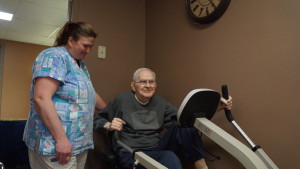Restorative Nursing
 Nursing-based rehabilitative care
Nursing-based rehabilitative care
Restorative nursing is ordered and overseen by nurses with consultation from therapists. This is different than therapy where therapy professionals provide treatment overseen by physicians. Typically, restorative nursing is needed due to a decline in skills due to chronic disease, disuse or other physiological factors. Goals of restorative nursing include restoring loss in function, maintaining restored function as well as preventing further loss in function.
Benefits of Restorative Nursing
- Delay decline in function
- Improve quality of life by helping to maintain independence as much as possible
Elements of Restorative Nursing
Training exercises, treatment and activities for individuals at these different times of their recovery:
- Recently discharged from physical, occupational or speech therapy
- Upon admission if restorative needs are present and physical, occupational or speech therapy is not appropriate
- At anytime during a nursing home stay when restorative needs arise
Areas of focus
- Ambulation
- Prosthesis care (excluding dentures)
- Splint/brace care
- Bed mobility
- Communication
- Dressing and grooming
- Eating and swallowing
- Range of motion, active or passive
- Transfers
- Bowel and bladder functions
Indicators that often trigger Restorative Nursing
- Balance issues
- Falls
- Decline in range of motion
- Decline in activities of daily living (ADLs):
- Bed mobility
- Eating
- Transferring
- Toilet use


